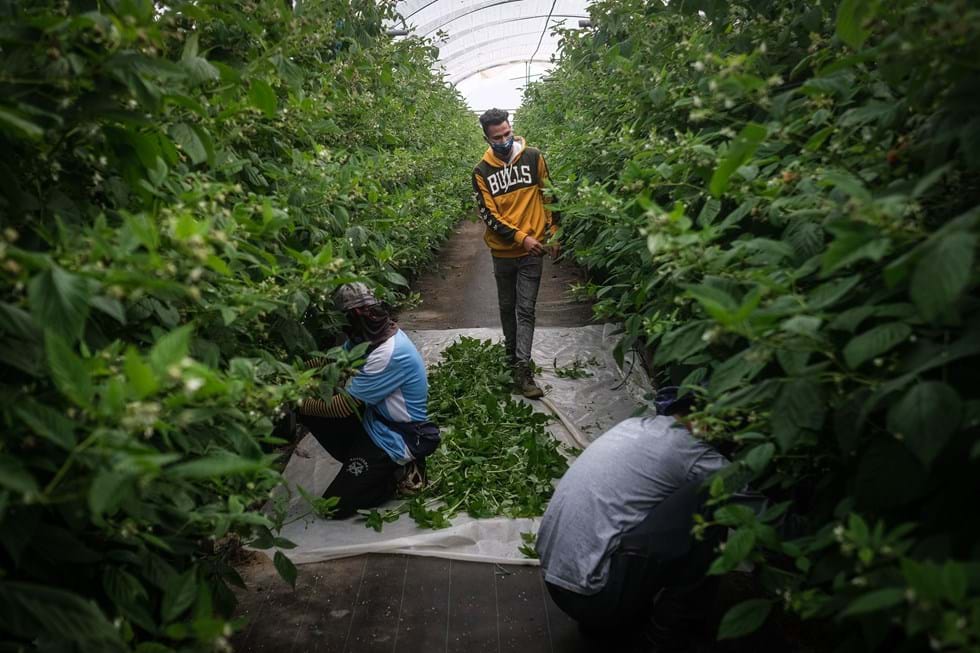Immigrant associations “determined to win new rights”
The current legal vacuum is of great concern to South Asian immigrants who pick vegetables and fruit destined for supermarket shelves and see their regularisation getting further and further away, writes Lusa.
“We’re here, we’re working, but we’re anxious about our future,” Ganesh Guragain, who arrived in Portugal three months ago and has been living for two months in a container belonging to an agricultural multinational near the village of Fataca, in the municipality of Odemira, a few kilometres from Vila Nova de Milfontes, tells the State news agency.
In neighbouring houses, there are practically only Nepalese, Bangladeshis or Indians, and in the villages, there are already some establishments that don’t sell coffee, only tea, the main tradition in that part of the world.
A few kilometres away, in the parish São Teotónio, is one of the largest centres of South Asian immigrants in the country, who have transformed the human landscape of Alentejo in recent years.
For those who came recently, the anxiety is greater. “We’ve heard in the news that Portugal wants to change the laws on immigration, and “that worries me”, recognised Ganesh Guragain, shortly after a meeting with leaders of the country’s largest immigrant association, Solidariedade Imigrante.
Its president, Timóteo Macedo, met with more than 50 Nepalese immigrants to discuss their legal challenges.
In June, the government suspended expressions of interest, a mechanism that allowed anyone who arrived in Portugal on a tourist visa to become legalised in the country, provided they showed 12 months of social security and tax deductions.
This was the resource that Ganesh Guragain was counting on, and now he doesn’t know how he will be able to regularise his stay in the country where he works and pays tax. “This situation revolts Timóteo Macedo”, says Lusa.
“We are on the ground. We know the reality of immigrants in Portugal”, a country that “needs a lot of people” to work and to provide “new experiences”, especially in the unpopulated interior, where there is only manual labour to be done.
“If it weren’t for immigrants, in many of these villages and towns, the situation would be worse for the Portuguese who are here”, suggests Macedo, pointing out that “without people, there is no land.”
In his conversation with Nepalese immigrants on the agricultural estate, Macedo stressed that “without documents, people are weakened and more subject to exploitation”.
Today, “European policy criminalises immigrants”, he went on, approving a “pact against those who immigrate” and “creating detention centres” – a trend of isolation of which Portugal is also a part, said Macedo.
“Portugal has created a mini-SEF (Foreigners and Immigration Service) within the PSP to carry out deportations and close the doors to immigration,” he went on, emphasising that this policy runs counter to the position of business associations.
“Entrepreneurs say that without you, there would be no agriculture. Fishing bosses say that without immigrants, fishing would be impossible. Without immigrants, there would be no catering,” he summarised Macedo.
Speaking to Lusa after the meeting, Macedo regretted that this issue doesn’t mobilise more Portuguese people. “We want a strong welfare state, but we want a much stronger civil society, with the power to intervene and act on policies.”
In the case of immigration, the government needs to “appreciate the work that associations (like his) do”.
To this end, he said, it is essential that AIMA, the Agency for Integration, Migration and Asylum “resume the process of permanent regularisation for the people who are working here and who contribute to our country’s economic, social and cultural development”.
A mass demonstration organised by various immigrant associations for October 25 has been scheduled as a way of putting pressure on the government to back down on what immigrant associations like Solidariedade Imigrante describe as “its protectionist measures”: “We need to win other rights and that’s what we’re going to do,” says Macedo.
Shanta Bhandari came from Nepal six months ago to work for a company in the environmental sector and doesn’t know if he’ll be able to regularise his situation. The suspension of ‘expressions of interest’ has closed the door on him because he doesn’t have 12 months of deductions.
But the Portuguese government continues to tax the salaries of those to whom doors are close to regularisation. “I don’t have access to the system I’m paying into; I don’t feel safe,’ Bhandari tells Lusa.
In the same situation is Shyam Chapagain, who has been working in Portugal for five months on the agricultural estate where he sleeps in a container provided by the multinational. “I want to stay here, when we arrived they said we could sort our lives out”, but now his case “isn’t good”, he acknowledges.
“I want to stay in Portugal, but we have to be legal”.
Similarly, Ganesh Guragain likes his job, which, he says, allows him to dream of Europe.
“It’s a job, it’s not bad. But this only makes sense if we can legalise ourselves,” he stressed.
Source: LUSA




















